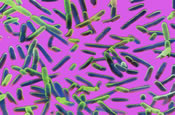Coliform Bacteria Analysis
MPN (Most Probable Number)
"Coliform bacteria" refers to several genera of Gram-negative bacteria in the family Enterobacteriaceae. These bacteria are generally harmless and naturally occur in soil, water and the digestive systems of animals. While usually not pathogenic, fecal coliforms, including E. coli and Enterococcus, are frequently used as indicator bacteria for possible contamination by other pathogenic organisms.
 MPN analysis, or "most probable number" analysis, allows quantification of coliform bacteria, giving you the concentration of coliform bacteria in your sample. Typical sources requiring MPN analysis for coliforms include drinking water, water parks, and other recreational waters (e.g. oceans, rivers, and lakes). High levels of fecal coliform bacteria in these sources corresponds to an increased chance of developing illness.
MPN analysis, or "most probable number" analysis, allows quantification of coliform bacteria, giving you the concentration of coliform bacteria in your sample. Typical sources requiring MPN analysis for coliforms include drinking water, water parks, and other recreational waters (e.g. oceans, rivers, and lakes). High levels of fecal coliform bacteria in these sources corresponds to an increased chance of developing illness.
The most probable number (MPN) analysis is commonly used to measure total and fecal coliform bacteria. Forensic Analytical Laboratories is pleased to offer the Quanti-Tray ® Method developed by Idexx Laboratories, Inc., which can provide you with an MPN quantification of fecal coliform bacteria in water and bulk samples in as little as 24 hours, and at a lower cost than the traditional MPN analysis.
MUG (4-Methylumbelliferone Glucuronide)
Positive/negative tests (e.g. MUG (Colilert) test for total coliform and E. coli and Enterolert for Enterococcus) can be used to detect whether the fecal bacteria are present in a sample. These analyses are quick and inexpensive. However they are limited as they only provide positive/negative results and do not quantify. They are used in sewage screens.
